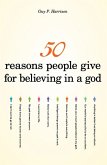Does God exist? This straightforward question has spawned endless debate, ranging from apologists' supposed proofs of God's existence to New Atheist manifestos declaring belief in God a harmful delusion. In Disbelief, Will M. Gervais, Phd., a global leader in the psychological study of atheism, shows that the ubiquity of religious belief and the peculiarities of atheism are connected pieces in the puzzle of human nature.It's undeniable that religion is a core tenet of human nature. It is also true that our overwhelmingly religious species is also as atheistic as it's ever been. Yet, no scientific understanding of religion is complete without accounting for those who actively do not believe. In this refreshing and revelatory book, Gervais argues that religion is not an evolutionary puzzle so much as two evolutionary puzzles that can only be solved together. First is the Puzzle of Faith: the puzzle of how Homo sapiens and Homo sapiens alone came to be a religious species. Second is the Puzzle of Atheism: how disbelief in gods can exist within our uniquely religious species. The result is a radically cohesive theory of both faith and atheism, showing how we became a uniquely religious species, and why many are now abandoning their belief.Through a firsthand account of breakthroughs in the scientific study of atheism, including key findings from cognitive science, cultural evolution, and evolutionary psychology, Disbelief forces a rethinking of the prevailing theories of religion and reminds both believers and atheists of the shared psychologies that set them on their distinct religious trajectories. In casual prose and with compelling examples, Gervais explains how we became religious, why we're leaving faith behind, and how we can get along with others across the religious divides we've culturally evolved.
Dieser Download kann aus rechtlichen Gründen nur mit Rechnungsadresse in A, B, BG, CY, CZ, D, DK, EW, E, FIN, F, GR, HR, H, IRL, I, LT, L, LR, M, NL, PL, P, R, S, SLO, SK ausgeliefert werden.









